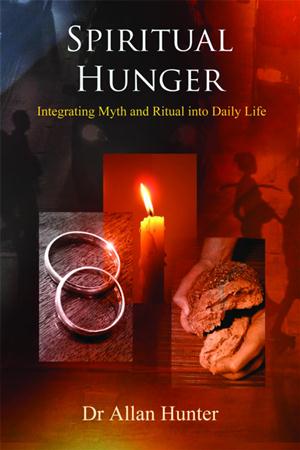The Nature of Spiritual Hunger

These days, spiritual hunger is mostly seen only in its negative aspect. Most people experience it as that feeling that nothing much matters, that we don’t care much about anything or anyone, not even ourselves. We may feel it as a lack of love, a lack of meaning that seeps into our lives.
Spiritual Hunger – The Nature of Spiritual Hunger
By Dr. Allan G. Hunter
 Unfortunately, a growing body of people all over the world report feeling this same emptiness. Depression, for example, has often been linked to this sense of lack of meaning. Approximately one in four Americans will suffer from depression at some time in their lives—and those are just the people who report it. Compulsive activities and addictions can blunt this feeling, at least for a while. They give a direction to a life that has no direction but at a dreadful cost.
Unfortunately, a growing body of people all over the world report feeling this same emptiness. Depression, for example, has often been linked to this sense of lack of meaning. Approximately one in four Americans will suffer from depression at some time in their lives—and those are just the people who report it. Compulsive activities and addictions can blunt this feeling, at least for a while. They give a direction to a life that has no direction but at a dreadful cost.
In this book, I’m going to show you how you can push back against this tide of despair and find deep meaning in your life. This is because spiritual hunger is, in itself, entirely natural. We long for a meaningful connection to something bigger than ourselves. We yearn to know that we are not alone in our situation in life and that others have been in similar situations and survived. When we find this knowledge we can feel more centered in our lives, our culture, our world. This is the positive side of spiritual hunger. It urges us to find more meaning in our world. It asks us to look more deeply into the experience of being alive.
So where can we find this sense of connection? The answer may surprise us. We can learn how to feed our own souls if we pay attention to literature, to myth, and to another form of “story”: ritual.
Words like “ritual” are treated with suspicion these days, and the idea itself has become tarnished. It has the smell of old churches, dust, and candle smoke about it. And, in fact, we’ve abandoned many of the venerated rites and formalities our ancestors would have upheld energetically. Often this is a great relief, but when we throw out a ritual, what is it we’re throwing out, exactly? In many cases, we’re rejecting the understandings and reassurances that held earlier generations together, the actions that provided them with a sense of social stability.
Researcher Brene Brown put it well when she said, “Stories are data with soul,” and we can extend this and say that ritual actions are a way of creating a lasting story, where the information takes on permanent value, and so gives us a way to remember it. In the process, it can open our hearts to the deep significance of the occasion—but only if we choose a productive and nurturing ritual.
On the whole, we live today in a culture that is strangely devoid of meaningful customs, and where ritual has been stripped of its sense of story. For example, children progress through our schools in a sort of lock-step that has to do with exams and graduating. Unfortunately, the emphasis is on the exams and passing them rather than on developing a sense of personal awareness or individual responsibility that might be a better way of approaching adulthood. Certainly, that would be more helpful in navigating the outside world. Any deeply felt rituals of “graduation” and of being promoted to new levels of personal competence have been ignored. For many people, high-school graduation itself has been reduced to an excuse to dress up, and little more. The heart’s need for an affirmation that real change has occurred is left untended.
Here’s another example. Almost everyone takes a driving test. It’s just a chore we have to get through. Yet huge numbers of teenage drivers in the United States kill themselves and others because they can’t handle the responsibility of being in charge of a large, powerful motor vehicle. It’s the leading cause of death for American teens.
This is something we really ought to be concerned about, yet even a quick look at the situation will show us that these young people have been trained for the test but not taught about how to handle their own responses to power. Is this really so very far removed from the ancient legend of the young Phaeton, who begged his father Helios to let him drive the sun-chariot, lost control of it, and was killed? The Greeks had that legend for a reason.
Again, in the United States, we have the right to “bear arms.” As a result, every year about 12,000 people die in gun-related incidents. That’s a lot of coffins. It’s close to three times as many deaths as were incurred by US forces in nearly 10 years of full-scale war in Iraq.
My point is that the law guarantees these rights, but there are few understandings about the responsibilities involved. Laws cannot save us from ourselves; responsibilities can. And these responsibilities are traditionally taught through story, legend, and ritual. Laws are always about lower, external compulsions to conform, while responsibilities require us to use our higher moral awareness and involve our hearts more fully in the business of living. Yet we cannot live from this higher heart-awareness if we’re only looking at getting what we can get right now in order to keep up with our peers. This sense of competition, of ego gratification, actually separates us from everyone else. In contrast, a responsibility makes us more aware of our connection to our community, and this is a heart-based connection.
Without this heart-based connection, many people tend to feel lost, so they act in ways that are not always healthy. This is especially dangerous for our young people. Religion no longer seems sufficiently strong to uphold the cultural values we once lived by, and anyway, our culture is changing too fast for most of us to comprehend. That’s why so many of us suffer from spiritual hunger. We know we need something to nourish our sense of being, our sense of purpose, and of belonging, but we can’t find much that will satisfy that need.
If we accept that we can look for guidance to those long-neglected myths, legends, and rituals that exist in our culture, we’ll need to see how they work so that we can feed our hearts and spirits. For all three of these sources of guidance depend upon us knowing the stories or ritual actions so that we can practice vital life lessons and become aware of our limits before a crisis arises.
Let me give you an example.
I once asked students at one of my writing workshops to define courage. Courage is a word that derives from the French word coeur, meaning “heart,” so coeur-age has an underlying meaning of living from the heart.
The workshop members considered this and other ideas, and we had a lively and far-ranging discussion but, in the end, we all agreed on a definition: Courage is, in large part, knowing the right thing to do, then doing it—no matter how frightened you may be. So the “right thing to do” is based on a knowing that exists not in the mind but in the heart.
It’s a pretty good definition. As it happens it also applies to military training, where recruits are taught how to manage their fear and stick to their guns so that they will continue to do what they’re told, no matter what. Some people call that brainwashing, but I’m not so sure we can always jump to that conclusion. Doing the right thing while under stress depends upon repressing the desire to run away, so courage is at some level always about being prepared for what happens.
Being prepared gives us better options. We don’t panic. We make better decisions because we’re acting rather than reacting. It happens because we are telling ourselves a new story about who we are. When we do this we are no longer ruled by blind impulses. What this means is that courage is, to a large extent, about being sufficiently aware so that we can move through fear to a place of making strong choices—reasoned choices—when others might succumb to panic.
On the whole, good decisions come when we are in a calm and centered place, and bad decisions happen when we’re agitated, angry, or frightened. Courage and wisdom are, therefore, inextricably linked. In contrast, panic is always about me, about saving my skin. Courage and wisdom are always about community, and these are loving energies since they do not see us as separate from one another. The wise decision helps everyone, not just the decider.
This is also a first-class recipe for getting through life. If I’m prepared for the likelihood that an acquaintance or relative is going to say something cruel, then I am not forced into being defensive and don’t have to feel hurt. I can choose to act from compassion, instead. More simply, if I know what a skid is when my car skids on snow and ice I will know what to do to get safely through the situation without endangering myself or others. Wisdom is not just about knowing the right thing to do; it’s being able to keep on knowing it even when under stress.
Our mental health depends largely on understanding this. When a toddler screams at us we don’t have to take it personally, because it’s just a toddler screaming at us. That is a healthy reaction. Yet some people hit their children because they don’t know there’s any other way to react.
So we can see that training ourselves for whatever delights and disasters happen in our lives is—within reason—an entirely sensible way forward. It means that life experiences are no longer quite as raw and surprising as they might otherwise be. They can be understood by talking about the experience, sharing the knowledge— and that is also a ritual action.
Cultures depend upon this offering of vital advice in the form of stories and literature for exactly the same reason: to prepare us for whatever human situations will come and give us a standard of conduct that we can compare ourselves to. And they’ve done so for thousands of years. Some of that wisdom and awareness has been codified in rituals and myths. We can survive without this information, of course, but our lives will be qualitatively different. Ritual, at its core, creates a sense of order in what might otherwise seem like a chaotic world.
But there is more. When we feel connected to a meaningful ritual what we feel is gratitude for the wisdom in it, and that sense of gratitude is felt not in the mind but in the heart. Meaningful ritual, a ritual that we understand thoroughly, is a way to open the heart and keep us in a place of real gratitude for the wonders of our life. It feeds our spiritual hunger and brings us closer to one another; the lack of it feels like loneliness and desolation.
Let me tell you a story that illustrates this.
When I was 10 years old, my parents decided to send me to a good, old-fashioned British boarding school—a “public school” with ivy on the walls and headmasters with canes with which some of us were routinely thrashed.
From a practical point of view, the decision to send me away was actually a good one: I had a scholarship, so my education would cost very little. My brother had gone to a similar school before this. It would help me grow up. It was socially acceptable to treat small boys this way. By many of the standards of the day, it was the “correct” thing to do. At the age of 10, though, none of this made any sense to me. All I could think was, “How could you do this to me?” I’d worked hard, been a good boy, done my homework, got the scholarship—and now they were abandoning me to this hellhole!
I knew how grim and spartan such places could be because my brother had also shed bitter tears when he was sent away, and told sad tales of loneliness, cruelty, theft, and bullying, on his return. Or perhaps I should say that he told us very little about these things, but we could feel them, even so. The stiff upper lip didn’t conceal the pain. We were both tall for our age, but there were mean older kids who were tall for their ages, too, and who vented their own sense of abandonment on the new kids. “Lambs to the slaughter” is a phrase that springs all too readily to mind.
I attended that school for seven years. I did get an excellent education, as it happened, but I also learned to trust no one. My mind was highly educated—but not my heart, nor my spirit.
Decades later I read about initiation rites in various non-Western societies, especially Papuan and Australian aboriginal rituals, which were broadly speaking an echo of many other rites across the globe. In those societies, the pubertal male child is taken away from the mother and the women’s compound where, until now, he has been a rather pampered little lord.
In an elaborate pantomime that the adults know only too well, the boy is snatched away by the male members of the tribe, who are dressed in ferocious ways, making terrifying noises, perhaps wearing masks so they are not identifiable, and behaving quite unlike their usual selves. The women wail as if they fear the boys will be killed.
The scared young boys are then taken to the designated ritual place and are given ritual scars. In some cultures, they may be circumcised, and they generally undergo brief but painful rites. At the end of this, they are made to realize that they are part of the men’s compound now. They cannot go back to their mothers in the same way as before. They are told they are the latest recruits to the male society and that everything will change, now. The older men then congratulate them on their bravery and endurance, and welcome them lovingly into a new way of life, explaining that this is for their own good.
If we think about it for a moment this ritual has a certain eloquence. It tells the young boy that his relationship to women and to his mother will change, that it must change, and from now on he has certain responsibilities he has to fulfill. The ritual and the scars impress this on his mind and his body.
You can imagine the situation. After the boy has recovered from his shock, and after he’s grown a little older and been part of helping other younger boys through the same rituals, he’ll see the deep significance of what must have at first seemed to be meaningless cruelty. He’ll see that he has a place in the world, a right to be a male that has nothing to do with whether he gets a good job or joins the country club. It makes him part of a living myth about who he is.
At the age of 10, I went through something very similar in its general outline. The difference was that no one knew it was a ritual, so no one knew it had any psychic significance. It was just an unpleasant fact. Together with the other boys, I thought we’d all been delivered into a life of misery and unpleasantness. We felt that this was desperately unjust, so we became bitter, resentful, and callous to each other at the very moment when we could have used some loving support. Our world felt like a cruel place, and because it felt like that, that is exactly what we made it into.
Lacking any sense of the new form our lives had taken, or its significance, we fell back into the only form that was available to us: We bullied and victimized each other. This was a ritual of sorts, too—one that we created for ourselves. In schools and colleges in the United States today, this is still a problem. Whether we call it cyber-bullying, which has caused teenagers to commit suicide (several such cases are under discussion in the media today, in 2011), or whether it’s just written off as “hazing,” it’s basically the same brutality.
If, as schoolboys, we had known that there was a deep echo of an ancient and meaningful ritual in our experiences, if this information had ever been made available to us, then I’m sure we could all have learned to see our life situation in a different way. It wouldn’t have been a case of “my life feels like hell” but, rather, a sense that this was a test that would humanize us.
Unfortunately, we only got the first part of the meaning and totally missed the second. If we’d known the overall outline of what was going on it would have helped us to cultivate our awareness and with it our courage, and perhaps many other qualities, including trust, and a sense of the dignity of human existence. Life would have had a shape we could have identified, and it would have been less random, chaotic, and frightening.
Whatever it was we learned at that time, it was certainly not courage. I can see that now. I had lived through a pubertal ritual without knowing what it was. And if you don’t know what a thing is, it’s very hard to see meaning in it.
The point I wish to make is this: If we—that crowd of little boys—had been able to see what was going on shortly after the event, then we’d have made more sense of it. We’d have been able to live our lives with greater courage, knowing that we had to mobilize our own best selves from now on.
But we didn’t. During our vacations, we went home and were overly cosseted by our guilt-ridden mothers and indulged by our bewildered fathers. Then, at the start of each new semester, we were sent out into the wilderness again. The shock of this change was like having an old wound reopened, each time a little deeper.
We hadn’t broken free of our mothers at all, it seemed, and we certainly weren’t the equals of our fathers. So where were we? Frightened, for one thing, and desperate not to show it.
An opportunity for psychic growth and for meaningful mutual support had been squandered. The authentic spiritual development of thousands of boys like me had stalled, and for some would never restart.
The experience wasn’t all bad—many of us learned self-sufficiency, and real, vital friendships did grow amid the ruins—but it could have been so much more.
Excerpted with permission from his new book Spiritual Hunger: Integrating Myth and Ritual into Daily Life
Click HERE to Connect with your Daily Horoscope!
You will also enjoy Spiritual Egotism – The Dark Side of New Age Philosophy
About the Author
Allan Hunter was born in England in 1955 and completed all his degrees at Oxford University, emerging with a doctorate in English Literature in 1983. For the past twenty years, he has been the professor of literature at Curry College in Massachusetts and a therapist. He is the author of many books.
To learn more, or to purchase SPIRITUAL HUNGER, click on the book cover,
or visit FindhornPress.com
OMTimes Magazine is one of the leading on-line content providers of positivity, wellness and personal empowerment. OMTimes Magazine - Co-Creating a More Conscious Reality







Spiritual hunger, (whether we know it or not), is the longing for Truth, and for the recognition of the Creator. Drink from the Source: ‘In the Light of Truth’, the Grail Message by And-ru-shin. You’ll thank me later.